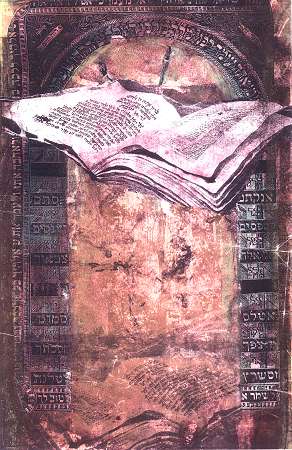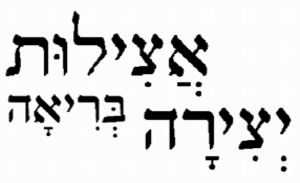 December 07
December 07
Jewish Mysticism in the University: Academic Study or Theological Practice?
Boaz Huss
This essay is based upon a lecture given on May 30, 2006, as part of the program: "The Academy and Spirituality: Can They Go Together?" at the Van Leer Institute in Jerusalem. A more detailed discussion of some of the issues raised here can be found in my: `The Mystification of Kabbalah and the Myth of Jewish Mysticism` Pe`amin 110, 2007, pp. 9-30 (Hebrew).
Recently, a debate has taken place about how to teach Jewish "mysticism" in Israeli academic contexts. This debate was sparked by a talk given by Dr. Avraham Elqayam in the Fourteenth World Congress of Jewish Studies, in a panel titled "How should we teach mysticism in the academy?", as well as by news of plans to set up tracks for the study of mysticism, religion, and philosophy in Beit Berl Academic College and in the Open University.[1] Dr. Elqayam, and other scholars in his camp, argue that there is a need to include practical and experiential elements in the context of teaching Jewish mysticism and spirituality in the academy. Other scholars argue that in an academic context, Jewish mysticism ought to be taught in a purely theoretical manner.
Although these two positions oppose each other, each is based on the same common assumption, namely that Kabbalah (along with the Hekhalot literature, Hasidism, and other Jewish cultural formations) is a Jewish expression of a universal mystical phenomenon. The debate deals with the question of how to teach the phenomena that are perceived as "mystical", and whether special methods of instruction and research, different from those used in other areas of the Humanities and social sciences, are needed in order to teach them.
 In what follows, I shall not take either side in this debate. Rather, I shall question the very assumption that lies at the basis of it, namely that various cultural formations, including the Kabbalah, are a Jewish expression of universal mystical phenomenon. In my opinion, we should question the modern myth of "Jewish mysticism" - and reject the Mystification of Kabbalah. "Mysticism" is not a universal category that should be used as a basis for academic study; rather, it is a Christian theological term, that was used in the modern period due to political or theological motivations - in order to classify and categorize phenomena from non-Christian cultures. The use of this term is bound up in a theological position which I believe, has no place in academic scholarship. The argument regarding how to teach "mysticism" is fundamentally not an academic debate, but a theological disputation. I am no theologian, but a scholar of culture, and therefore I take no side in this debate.
In what follows, I shall not take either side in this debate. Rather, I shall question the very assumption that lies at the basis of it, namely that various cultural formations, including the Kabbalah, are a Jewish expression of universal mystical phenomenon. In my opinion, we should question the modern myth of "Jewish mysticism" - and reject the Mystification of Kabbalah. "Mysticism" is not a universal category that should be used as a basis for academic study; rather, it is a Christian theological term, that was used in the modern period due to political or theological motivations - in order to classify and categorize phenomena from non-Christian cultures. The use of this term is bound up in a theological position which I believe, has no place in academic scholarship. The argument regarding how to teach "mysticism" is fundamentally not an academic debate, but a theological disputation. I am no theologian, but a scholar of culture, and therefore I take no side in this debate.
I shall make two related arguments. The first is that the term “mysticism” is a theological concept, and the second is that theological concepts have no place in academic studies in the field of the humanities and social sciences, including the study of Kabbalah and Hasidism. I would like to emphasize that I do not oppose theological praxis. Far from it— I am very interested in it, and it is itself the subject of my academic study. Rather, I argue that theology can not be the basis of academic research of historical, social, and cultural phenomena. In conclusion, I shall briefly touch upon the question of whether there is any place to open, in the context of academic institutions in Israel, departments or schools of theology and /or spirituality, in which there will be room to engage in theological praxis which I believe should have no place in the context of the scientific study of the Humanities and social sciences.
"Mysticism" is a Theological Category
The word "mysticism" is essentially a Christian theological term. Its etymology, of course, is Greek, but the meaning of the term, as it is used today, is rooted mainly in medieval and early modern Christian theology. In the modern period, the term's meaning became broader, and it now is used to refer to various phenomena in non-Christian cultures, as well, including Indian, Chinese, Muslim, and Jewish cultures. [2] The expansion of the semantic field of the term "mysticism", and its use to refer to cultures that knew nothing of this term, have been made in the context of Western imperialism and colonialism, and in the framework of using European discursive terms in the formation of non European national identities.
I would like to emphasize that it is not only that the etymology of the word “mysticism” is rooted in Christian theology, but that even today, the use of the term is inextricably connected with theological presuppositions. Numerous different definitions have been offered for the word mysticism.  Almost all of them are based on the assumption that the common cause of “mystical” phenomena is the experience of an interaction, or a union, with a metaphysical reality— an experience that entails a unique state of consciousness, and is considered to be the epitome, or the peak of the religious experience. [3]
Almost all of them are based on the assumption that the common cause of “mystical” phenomena is the experience of an interaction, or a union, with a metaphysical reality— an experience that entails a unique state of consciousness, and is considered to be the epitome, or the peak of the religious experience. [3]
Different scholars of mysticism use different terms to denote the metaphysical reality which mystics of various cultures encounter, such as God, the Divine, the Absolute, the Transcendent, or Pure Consciousness. The shared assumption behind all these definitions is that people of different cultures all experience an encounter with a transcendental entity, and that this encounter influences their social activity and the cultural products that they create in the aftermath of their mystical experiences. This assumption is shared by many scholars in the field of the study of religions, by esoteric movements from the turn of the nineteenth to twentieth centuries, and by new age movements from the second half of the twentieth century. [4] Again, I do not wish to argue that this theological position is invalid— but rather to suggest that academic research of social and historical phenomena should not based on such a theological presupposition.
Among scholars of mysticism, there is a famous debate: is there such a thing as a “pure mystical experience” which gets interpreted in various ways in different cultures, or is the mystical experience itself culturally dependent? [5] I shall not enter this debate here, but I would like to note that even the “contextualists” who argue that there is no such thing as a pure mystical experience that is independent of culture, [6] accept the theological presupposition that behind the culturally dependent mystical phenomena lies an experience of an encounter with a transcendental reality. I would like to mention also that there are scholars that try to give naturalistic explanations for “mystical” phenomena. Although these scholars reject the theological stance, which presupposes that various cultural phenomena are a result of an encounter with a metaphysical reality, nevertheless, they still use the category “mystical” to describe these phenomena, a category which is based on such a theological conception.
The Category “Mysticism” is not Appropriate in Academic Research
The use of the modern theological term “mysticism” to describe and categorize Jewish cultural formations began in the nineteenth century, and became widespread towards the end of the nineteenth century and the beginning of the twentieth. Due to the work of Gershom Scholem, it became the founding term of an academic field dedicated to the study of “Jewish Mysticism,” which gained considerable prestige in the Israeli, American and European Academy. The very use of a Christian theological term to denote phenomena in other cultures should raise questions in our mind (and indeed, a number of scholars have raised this question; though they have not come to the conclusion that we should avoid the term [7]). Throughout Jewish history, people have described occurrences such as visits to the Palaces [hekhalot] of Heaven; seeing the Appearance of God; hearing the Divine Presence [Shekhina] speaking out of their throats; or raising their thoughts up to the point of Nothingness [ayin]. However, they never described these occurrences as “mystical experiences” (at least, not until the twentieth century). Not only is the term “mystical” foreign to Jewish sources, but also the word “experience” [Havaia] did not exist in Hebrew, until the twentieth century. [8] I do not think that academic scholars are obliged to use exclusively concepts and categories that have been used by the subjects of their studies; nonetheless, there is no justification for an uncritical use of a Christian theological term as a universal category in academic research.
Furthermore, I believe that there is no common denominator between the various above-mentioned Jewish phenomena, unique to them alone, apart from the assumption of scholars that they all belong to the category “Jewish mysticism,” and that they are all expressions of an encounter with a transcendental reality. Indeed, while one can find common features between some of the phenomena subsumed under this name, visiting the Heavenly Palaces, seeing the appearance of God, hearing the voice of the Divine Presence, and raising one’s thoughts up to the point of Nothingness have no more commonalities with each other than they do with many other phenomena, which are not perceived as “mystical.”
Footnotes
[1] Both the lecture and the proposal have been widely covered in the media. For online coverage, see http://www.nrg.co.il/online/15/ART/990/887.html and http://news.haaretz.co.il/hasite/pages/ShArt.jhtml?contrassID=1&subContrassID=5&sbSubContrassID=0&itemNo=687701 and http://www.nrg.co.il/online/15/ART1/054/500.html.
[2] See L. Bouyer, `Mysticism, An Essay on the History of the Word`, R. Woods (ed.), Understanding Mysticism, London 1981, pp. 42-55; M. De Certeau, The Mystic Fable, London 1992, vol.1, pp. 76-112; Leigh Eric Schmidt, `The Making of Modern Mysticism`, Journal of the American Academy of Religion, 71, 2003, pp, 273-302.
[3] For the different definitions and perceptions of the "mysticism," see B. McGinn, The Foundation of Mysticism, New York 1991. pp. 265-343.
[4] See R. King, Orientalism and Religion: Postcolonial Theory, India and The Mystic East, London & New York, 1999, 162-163. On the relationship between modern religious studies and Christian mysticism and esotericism, see S. M. Wasserstrom, Religion after Religion: Gershom Scholem, Mircea Eliade, and Henry Corbin at Eranos, Princeton 1999, p. 29 On the relationship between religious studies and the "new age" see W. Hanegraaff, New Age Religion and Western Culture: Esotericism in the Mirror of Secular Thought, Albany 1998, pp. 327-330. On the "New Age" and Jewish Mysticism, see Boaz Huss, `The New Age of Kabbalah Research: Book Review of Ron Margolin, The Human Temple; Melila Hellner-Eshed, A River Issues Forth from Eden; Jonathan Garb, Manifestations of Power in Jewish Mysticism`, Theory and Criticism 27, 2005, pp. 246-253 (Hebrew); Jonathan Garb, `The Power and the Glory: A Critique of New Age Kabbalah,` www.zeek.net/604garb/.
[5] On this controversy, see B. McGinn, The Foundation of Mysticism, pp. 317-326; R. King, Orientalism and Religion, pp. 162-186.
[6] The best known presentation of this position is S. Katz, `Language, Epistemology, and Mysticism`, Idem (ed.), Mysticism and Phlosophical Analysis, 1978, p. 26; Idem, `The Conservative Character of Mystical Experience`, Idem, (ed.), Mysticism and Religious Traditions, Oxford 1983, pp. 3-60.
[7] See Joseph Dan, The Heart and the Fountain Jerusalem 2005, p. 18 (Hebrew). Despite Dan's reservations, he adopts Scholem's use of the term "Jewish mysticism." See ibid., p. 21. See also Ithamar Gruenwald, `Reflections on the nature and Origins of Jewish Mysticism`, in Peter Schafer and Joseph Dan (eds.), Gershom Scholem's Major Trends in Jewish Mysticism, 50 Years after, Tubingen 1993, pp. 28-29.
[8] The term "experience" is a translation of the German term erlebniss, and is not found in non-European cultures. See Robert H. Sharf, `Experience,` in Mark C. Taylor (ed), Critical Terms for the Religious Studies, Chicago & London, pp. 99-100.










